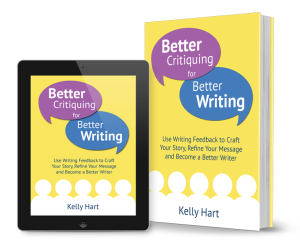
The first thing you need to consider when offering feedback or critiquing a book is that the author of the work has spent hours creating it.
To the writer this isn’t just another piece of writing – it’s their baby, their Frankenstein. It’s the first thing they think of when they wake in the morning, the last thing before they go to sleep, sometimes characters even infiltrate the writer’s dreams.
For this reason try to be as diplomatic as possible; no one wants to be told bad things about their baby.
This doesn’t mean that you shouldn’t be honest about what you found, in order to save the writer’s feelings. You need to be honest to help the writer grow. Critiquing is about trying to help the writer reach the full potential for that piece of writing and you do this by giving them feedback they can use.
It’s not as simple as saying that you like or dislike something. Saying things like “I’m not quite sure about this section” or “I don’t like it” are worthless comments if you can’t tell them why.
In fact it’s worse than worthless, it’s damaging.
Being kind can be cruel
Unfortunately these kinds of comments can come from the people we love most, our friends and family. Not because they are trying to hurt us, but because they don’t know how to give the kind of critique that would help improve our writing. Sometimes they will just tell us what we wish to hear “I love it, it’s fantastic.”
The truth is even this is unhelpful.
Keep these points in mind
- If you don’t like something about the story you have the right to say so, but tell the writer why you didn’t like it and make a suggestion on how they might fix the issue.
- If it’s the entire story you don’t like and this is because the genre is not something you like to read, tell the writer that the genre is not to your liking. This story may not be to your taste, but for someone who likes that genre it may be fantastic. This gives the writer the option of finding others who like that genre to critique their writing.
- It’s also a good idea to say which parts you enjoyed and why you enjoyed them. This helps the writer figure out what is working and whether or not to keep them in their final draft. Try to find some good things to say about the writing, as only hearing bad points may discourage the writer and damage their confidence in writing.
Kelly
Remember to click ‘Like‘ or ‘Tweet‘






Connect With Kelly